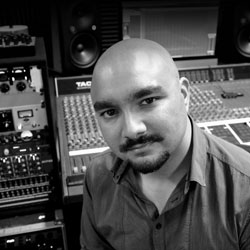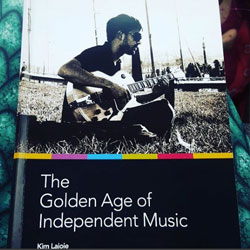Kim Lajoie is the author of “The Golden Age of Independent Music”
 Kim is a music producer and artist mentor. He is the man behind Obsessive Music. ‘The Golden Age of Independent Music’ shares Kim’s views on the music industry – from where it has been to where it can be. His insightful knowledge backed with over 25 years of experience is expressed in an easy to deigest format that will leave you thinking.
Kim is a music producer and artist mentor. He is the man behind Obsessive Music. ‘The Golden Age of Independent Music’ shares Kim’s views on the music industry – from where it has been to where it can be. His insightful knowledge backed with over 25 years of experience is expressed in an easy to deigest format that will leave you thinking.
What were your first artistic experiences and provided you with an interest in the arts?
I don’t have a memory of any particular event or experience that sparked my interest. My earliest memory of being intrigued by music was as a child listening to recordings and trying to identify the individual instruments and sounds in the mix. I didn’t know what they were called, I just remember realising I could hear the music as a composite of parts.
What led you to become an artist mentor?
It’s been a process that’s developed gradually over years. My own interest in the music industry has driven a great deal of my own research, observation and learning. As I’ve had conversations with artists, I increasingly found that my own views tended to give them new ideas, motivation and inspiration. That process developed on Facebook, in one-on-one sessions and in various workshops and classrooms.
From your experience what is the greatest challenge facing independent artists?
I’m pretty sure that the greatest challenge facing independent artists is within themselves. It’s their own fear, uncertainty, and doubt. It’s outdated notions of the role of artists and assumptions about how the music industry works. There are some very toxic cultural values underneath it that are very difficult to discuss in a public forum like this.
 In ‘The Golden Age of Independent Music’ you touch on helping artists understand that they are making music for others. Do you find that this is one of the most difficult obstacles for artists to overcome?
In ‘The Golden Age of Independent Music’ you touch on helping artists understand that they are making music for others. Do you find that this is one of the most difficult obstacles for artists to overcome?
It’s not so much an obstacle as a whole collection of obstacles. If the goal is to understand and accept that music has a very important role in our society, many artists encounter a lot of obstacles on their journey to that goal. These obstacles often include some very deep and personal issues that touch on pervasive cultural narratives, self-worth, assumptions about the relationship between art and business, the meaning of self-expression, and more. Every artist is different and it’s not easy to unpack. It requires a very sensitive and supportive approach.
What tips would you give an emerging artist to help them differentiate themselves and keep a competitive edge?
I don’t think differentiation or competitiveness are useful goals. They’re important, for sure, but they’re best treated as by-products of developing a strong emotional connection between the artist and audience. The reason any artist is not finding success has nothing to do with what other successful artists are doing. It’s about the audience connection.
How do you balance being an artist and being a business person?
The necessity for balance between art and business is one of the toxic lies that persists in the music industry today.
There is no need for balance because art and business are not opposites. It’s like asking how to balance between the driver and the passenger in a car – there is no need to ‘balance’ because they are not working opposite each other. They are working together, and it is important to make sure they’re both going in the same direction.
It’s the same with art and business. They should not be working against each other. They should be working together, as parts of a greater whole.
What dreams and goals have inspired you to succeed?
I think having goals and defining ‘success’ is important for short-term projects. This is how we know we’ve achieved what we intended, and how we can understand what went wrong so we can improve for next time.
For a career, or a life, however, I don’t think the notion of goals or dreams or a definition of success is very useful. I think it’s better to focus on learning and developing capabilities. If you have a goal, you have one way of winning. If you develop your capabilities, you have many ways of winning. If you have a goal, you can be torn between staying on your path versus exploring new opportunities. If you focus on learning, you can take on any side-quest that seems interesting.
For my career in music, I don’t have any particular definition of ‘success’. I don’t have an end-point in mind. My mission is to simply help people who make music – in whatever way I can, in whatever way they need it. I’ve been a professional photographer. I’ve produced music videos. I’ve been a publicist, a web developer, a recording engineer, a strategist, a confident and more. I direct my mental, physical, and financial resources toward that mission in whatever ways make most sense to me.
What exciting projects are next on the cards?
They’re secret. 😉